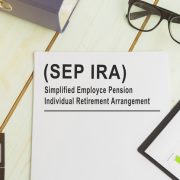Why SEP Plan is essential for Both Employers and Employees
A SEP (Simplified Employee Pension) is a plan whereby an employer contributes on a tax-favored basis to his/her employees’ IRAs (Individual Retirement Account). It is a plan that gives small businesses a pleasing alternative to standard profit sharing plans. If the employer conforms to specific conditions, it is not subject to disclosure and reporting needs of most retirement plans. Under a SEP plan, the employer deposits contributions into the IRA of employees instead of the employer trust account, thus simplifying the accounting process. A SEP does not require a broad written plan document and contains a minimum compliance disclosure and reporting requirements.
Advantages of Self-directed SEP
- Tax Advantages: SEP contribution is tax deferred for the employees as it is tax deductible to the employer
- Contribution Flexibility: the employer can make yearly discretionary contribution of about twenty five percent of the qualified employees’ compensation
- Investment Flexibility: employees can have a wider range of investment to choose from simply because they can choose from where their accounts are established
- Easy Setup: a SEP IRA is set up by an employer for the benefit of his/her employees. Here, there are no needs for a separate employer trust account because every employee sets up his/her own SEP IRA
- Minimal Administrative Costs: unlike the employer sponsoring profit sharing or qualified pension plans, employer sponsoring SEP plans is not expected to file yearly plan returns
- Limited Liability: as the employees (participants) choose their own investments after setting up SEP IRA, employer’s fiduciary duties are lessened
- Tax-planning Flexibility: SEP plans can be set up right until tax-filing deadlines and extensions
Why an Employer Should Set up SEPs For its Employees
There are good reasons why an employer should establish SEPs for its employees. Below are some of the reasons;
- The legal and administrative charges are significantly lesser than would be suffered under a qualified plan
- The profit earned on the SEP IRA is shielded from federal and some state income taxes up until withdrawals are made at retirement
- SEP contributions are deductible by the employer and it is not part of the employees’ annual income
- The SEP funds may grow into a substantial nest egg for retirement as a result of the tax-free compounding effects
- The SEP contributions are not in any way subject to withholding or FICA taxes except if you are a sole-proprietor
Pros and Cons of SEPs
- Contributions to a self-directed SEP IRA are tax deductible and can lesson your taxable income
- Contributions are only made by the employer and don’t have to be every year
- No employer filing requisites
- One disadvantage to employers of SEPs is that they must be used to cover part-time employees
- They don’t require much paperwork to report to the IRS
Who Can Use a SEP
Anybody or business owner who finds his/herself in any of the following categories can use a SEP or even should consider establishing a SEP;
- A business owner that will not know his/her financial status till tax time. This is because SEP is just about the only form of employer-sponsored retirement plans that can be set up at the end of the employer’s tax year including extensions. Also it is a plan where amounts of contribution can be decided after you know what your profits for the year would be
- Those that are being employed by a company on a regular basis but who moonlight for themselves as independent contractors
- Sole proprietors that have no employees. For these type of business owners, setting up a SEP is just like walking into a brokerage firm or bank and establishing an IRA
Contribution Limits of SEPs
In this current year, 2011, the contribution limits of SEPs of an employer to an employees’ SEP IRA cannot exceed the lesser of twenty five percent of the employees’ compensation or $49,000. And for the coming year, 2012, the contributions to an employees’ SEP IRA can also not exceed twenty five percent of his/her compensation or $50,000.
It is important to know that elective deferrals and catch-up contributions are not allowed in SEP plans.
Turning your SEP plan into a self-directed SEP plan entails many advantages and benefits. Self-directed accounts can invest in a variety of assets such as real estate, private lending, limited liability companies, precious metals and much more!
American IRA, LLC, is a third party administrator for Self-directed Retirement Accounts. American IRA, LLC was established in 2004 and currently has over 250 million in assets under administration. They protect your wealth by making sure that all uninvested cash under their administration is stored in FDIC-insured accounts. As administrators, they do not make any recommendations to any person or entity associated with any type of investment.
If you would like more information on this or any other type of self-directed retirement account, please feel free to contact the team at American IRA, LLC via e-mail [[email protected]] or via phone 1-866-7500-IRA(472), or visit their website [www.americanira.com].





